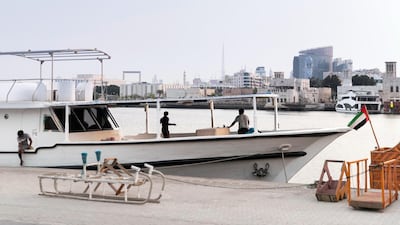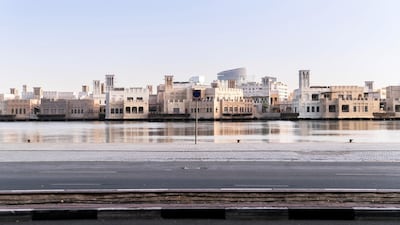A two-part documentary is charting Dubai's response to the Covid-19 pandemic.
Covid-19: Dubai provides insights into the decisions taken by authorities to protect public health as the virus rapidly spread around the globe.
The series, the first episode of which aired on Saturday on Discovery, begins with the establishment of the Covid-19 Command and Control Centre on March 30, 2020, concluding a little more than a year later, after a vaccination campaign had slashed hospital admission rates. The second episode airs on May 14.
The documentary, produced in collaboration with the government, features shots of empty streets, beaches and playgrounds at the height of the pandemic, interspersed with interviews with those who led the emirate's response.
“From the very early days of the command and control centre, it was made very clear decisions would be informed by science and guided by data,” said Dr Alawi Ali, chairman of Dubai’s Covid-19 command and control centre and the deputy director of Dubai Health Authority.
Dealing with the surge
One of the biggest decisions the command centre took early on was to place the Naif and Al Ras areas, home to the Gold Souq, under 24-hour lockdown.
“We got reports of many residents who were infected with the virus,” says Brigadier Dr Tariq Tahlak, head of Naif Police Station. “It was necessary to contain the area in order to mitigate the spread to other parts of Dubai.”
The decision was taken at 6pm, he says. By midnight, the entire area was “locked down,” he says.
“What I learnt here exceeds what I have learnt over many years.
“Most of our operations are to tackle crime. This particular crisis was different. When this crisis hit we were faced with a bigger challenge. We were fighting an unknown and invisible enemy,” says the police official.
The densely populated area was put under a strict four-week lockdown from March 31 to April 26, to curb the spread of the virus.
Dubai adopted a proactive approach in the early months of the pandemic, including the temporary introduction of stay-home orders and a move to close schools and switch to remote learning.
“It was a sort of a tactical pause so we could ramp up testing capacity. We could ramp up hospital capacity,” Dr Ali says.
“We could educate ourselves and the community about the virus. And then we open up gradually.”
Businesses hit hard by Covid-19
The documentary also covers the impact the pandemic had on the economy, through interviews with businesses both large and small, which were forced to pivot to survive.
They include Immensa, which operates in the additive manufacturing applications, 3D printing services and digital inventory space.
“Our business literally stopped overnight,” says Fahmi Al Shawwa, the company’s chief executive.
“We had contracts with different companies and I would say over a space of 72 hours, everything was put on hold.”
But an emergency dental appointment led to the company mass producing tens of thousands of face shields within days.
Mr Al Shawwa’s dentist had complained about the cost of face shields, which were hard to find and had to be imported from Asia.
“We finished and I headed back to the office and called the team. Within four or five hours we came up with a product,” he said.
His dentist was ecstatic, and within days he had orders for 15,000 after word got around among hospitals.
How life changed
The documentary also covers the effects the pandemic had on Ramadan, and the joy people felt returning to mosques after stay-home orders were lifted on June 24, 2020, and the emirate reopened with 30 per cent capacity in public areas.
“The movement restrictions were a tactic. They could never be a strategy to get over this pandemic,” says Dr Ali.
“So life had to move on. Dubai had to very quickly figure out how to get out of this and in the process live with it. A big part of it was you had to think and care about the people whose lives and livelihoods will be affected by the virus and also the people who will be affected by the way we fight the virus.”
Vaccination campaign
Vaccinations, on the other hand, were considered a strategy to exit the pandemic, he said.
“If you think about it, it’s such an amazing achievement for humanity and for science, that within a year of discovering a new virus you have vaccines that are safe and effective in protecting human beings against this disease.
“I don’t think we appreciate how massive a victory that is for science.
“The UAE and Dubai jumped on that.”
On Wednesday, April 14, 2021, the crew returned to Mediclinic Parkview Hospital, 440 days since the UAE recorded its first case.
There were only two patients admitted to the ICU with the disease.
“I think we run out of words thanking our frontliners and the heroes in managing this pandemic,” says Dr Amer Sharif, head of Dubai’s Covid command and control centre, and vice chancellor of Mohammed bin Rashid University of Medicine and Health Sciences.
“Without them we wouldn’t be where we are today.”
The final part of the documentary will air on Discovery in the UAE on May 14 at 10pm. Replays of the first episode are available on Discovery+, Jawwy TV and Starz Play.



















